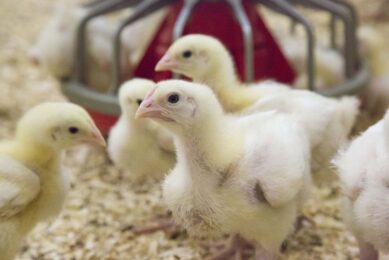7 challenges within antibiotic-free production

Like anything new or different, antibiotic-free production comes with its own challenges. And, these challenges make up many of the reasons why a lot of farmers currently don’t produce animals fully antibiotic-free.
On top of this challenge, today’s producer has the difficult proposition of producing more with less to meet the demands of a growing global population. How then can they reach that goal without the enhanced production available through antibiotic use?
Typical antibiotic-free livestock production challenges
Although they may vary by the environment, management methods and location, below are just some of the risks poultry producers have to prepare for in antibiotic-free production systems:
- Day-old chick health.
- Bacterial load in the gastrointestinal tract and the litter.
- 7-10 day-old mortality.
- Uniformity.
- Coccidiosis control.
- Therapeutic interventions.
- Feed passage and weight gain.
Ultimately, all these potential issues can add up to extra costs for the producer. To avoid this, it is important to focus on a couple key areas: biosecurity and nutrition.
Biosecurity in antibiotic-free production
Effective biosecurity cannot only help producers manage disease challenges, but also prevent the increased risks of many of the issues listed above. Required measures may include changes to animal flow, increased focus on housing and transportation cleanliness, as well as heightened securities on those entering the facilities, whether that be a worker from another farm or a small rodent visitor; it is important to protect the animals from the risk of exposure.
To be truly effective, it can’t be a silver bullet approach. With antibiotics reduced or removed, the front line of defence may be nutrition, but that is just the start. A combination of strategies has to be put into effect. By powering nutrition with technologies designed to support the animals’ immune and digestive systems, and by implementing a full programme focused on maintaining proper health, producers give their operations the best chance for a sustainable and profitable future.
Producing more efficiently
Some producers have been ahead of the trend, and have been practicing antibiotic-free production for many years. “When we accepted the challenge to go antibiotic-free from birth to market a few years ago, it proved to be a real challenge,” said Everett Forkner of Forkner Family Farms in Richards, Missouri. “But with the addition of nutritional innovations, we have not only been able to meet the challenge, we are producing more efficiently than when we began.”
Each farm is different, requiring each nutritional programme to be tailored to meet the needs of the animals and their environment for a truly effective antibiotic-free approach.
Allow time for adjustments
When asked what some of the keys were to making the transition, Forkner said, “Establishing the right nutritional platform takes time. You have to allow some time for adjustments in order to really see what is best for the animals. And for us as a livestock breeder, it has also been about selecting superior animals and genetic lines that have more natural health and stronger immune systems. On top of this, a major component for us has been building this into a comprehensive immunisation programme while enhancing our management procedures. This combination has been what has helped us go multiple years and generations of genetic selection with no antibiotic support.”
Due to the Veterinary Feed Directive, we will see more and more US producers focusing on antibiotic-free production. And with nearly 50 countries having some form of antibiotic restrictions, it is a global trend that will continue to grow. Alltech has been helping producers nourish the world for more than 35 years, while striving to ensure they remain sustainable and profitable.
Author: Justin Ellis, Alltech
To learn how Alltech is helping producers become profitable even without antibiotics visit Alltech.com/antibiotic-free.






